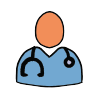Rhinosinusitis, commonly known as sinusitis, is the inflammation of the nasal cavity and paranasal sinuses. It can be classified as acute (lasting up to 4 weeks), subacute (4-12 weeks), or chronic (lasting more than 12 weeks).
Articles
Common Diabetes Medications
Common diabetes medications include various classes such as biguanides, sulfonylureas, thiazolidinediones, DPP-4 inhibitors, SGLT-2 inhibitors, GLP-1 receptor agonists, and insulin. Biguanides like metformin help decrease glucose production in the liver, while sulfonylureas stimulate the pancreas to release more insulin. Thiazolidinediones work on improving insulin sensitivity, and DPP-4 inhibitors help regulate blood sugar levels by blocking the breakdown of incretin hormones.
Answer to the DrBeen’s Question 4001
Read the question here: https://www.drbeen.com/blog/drbeen-question-4001/ The correct answer is A. Note the location of the auscultation point for the aorta (A) in this diagram before reading the explanation. Explanation Patient has aortic stenosis. Aortic...
DrBeen Question (4001)
A 42 years old patient presents to your clinic for a complete physical because he recently moved here from another state. He feels in good health. He has never smoked, doesn't have diabetes, and is sure that he does not have hypertension either. He exercises regularly...
The Best Ways to Help Your Teen With Anxiety
Helping a teen with anxiety involves several key strategies. Firstly, open communication is essential; encourage your teen to talk about their feelings without judgment. Educate yourself about anxiety to better understand what they’re experiencing. Teach them coping mechanisms such as deep breathing, mindfulness, and regular physical activity. Encourage a balanced lifestyle that includes proper sleep, nutrition, and limited screen time. Professional help, such as therapy, can be highly beneficial.
EKG – Difference Between MAT and PAT
An electrocardiogram (EKG) can differentiate between multifocal atrial tachycardia (MAT) and paroxysmal atrial tachycardia (PAT) based on their distinct patterns.
Liver Cirrhosis – Part I
Insult to liver on long run can cause fibrosis of the liver and formation of nodules ,which is termed as liver cirrhosis. Liver cirrhosis is a chronic condition of the liver in which there is fibrosis and formation of nodules. The normal architecture of the liver gets...
Diabetes Mellitus and Glucose Peak
Diabetes mellitus is a chronic condition characterized by high blood glucose levels due to the body’s inability to produce or effectively use insulin. Managing glucose peaks, or postprandial spikes, is crucial for individuals with diabetes to prevent complications. These peaks occur after eating, and keeping them under control involves monitoring carbohydrate intake, choosing low-glycemic index foods, and adhering to a balanced diet.

